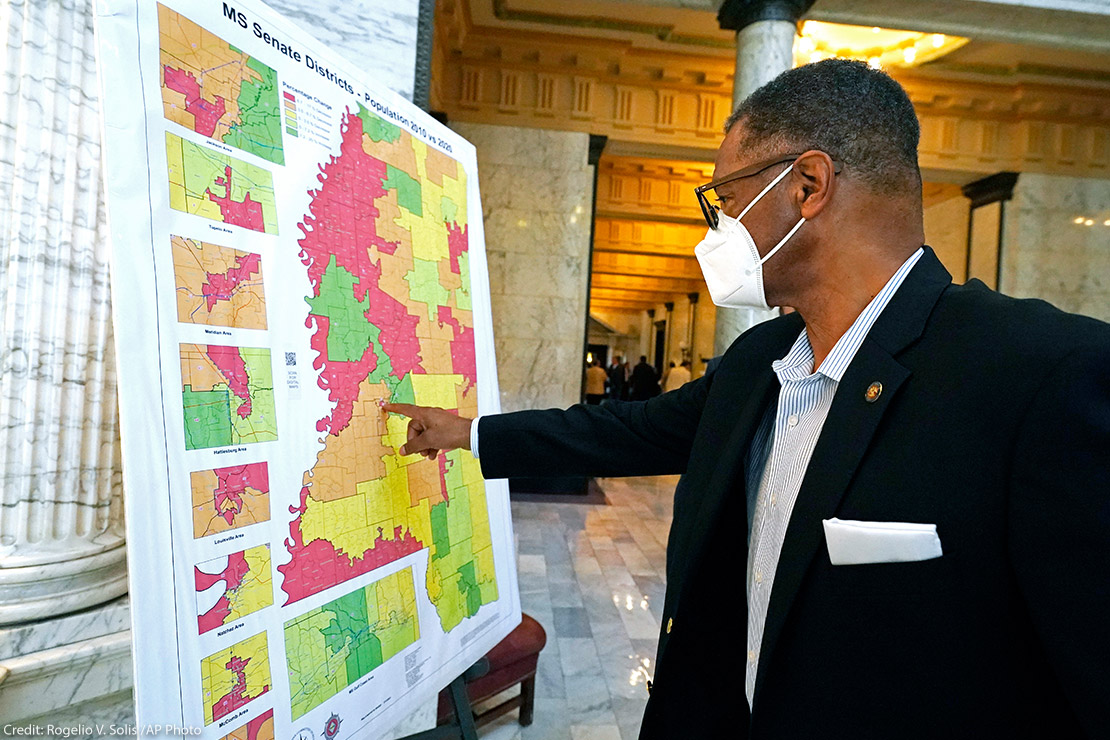
Mississippi State Conference of the NAACP v. State Board of Election Commissioners
What's at Stake
Mississippi has a growing Black population, which is already the largest Black population percentage of any state in the country. Yet. Black Mississippians continue to be significantly under-represented in the state legislature, as Mississippi’s latest districting maps fail to reflect the reality of the state’s changing demographics. During the 2022 redistricting process, the Mississippi legislature refused to create any new districts where Black voters have a chance to elect their preferred representative. The current district lines therefore dilute the voting power of Black Mississippians and continue to deprive them of political representation that is responsive to their needs and concerns, including severe disparities in education and healthcare.
Summary
In December 2022, the ACLU, the ACLU of Mississippi, the Lawyers’ Committee for Civil Rights Under Law, the Mississippi Center for Justice, the Law Offices of Carroll Rhodes, and Morgan, Lewis, and Bockius LLP filed suit in federal court to challenge the 2022 redistricting plans for the state house and state senate, on behalf of the Mississippi State Conference of the NAACP as well as individual voters affected by the unlawful district lines.
The lawsuit alleges that the 2022 redistricting plans violate Section 2 of the Voting Rights Act. Plaintiffs contend that multiple additional Black-majority districts could and should have been created—at least four in the state Senate and three in the state House. The failure to create those districts, combined with the history of racial discrimination in the state, deprives Black voters in the state of the right to participate equally in the political process, in violation of Section 2.
The lawsuit also alleges that the 2022 redistricting plans violate the Equal Protection Clause of the Fourteenth Amendment to the United States Constitution. Plaintiffs contend that voters in at least five districts—three in the state Senate and two in the state House—were sorted and assigned predominantly on the basis of their race, in order to lower the Black population percentage in those districts. Using race as the primary means of sorting voters — without a compelling justification to do so (such as to comply with Section 2 of the Voting Rights Act) — violates the federal constitutional right to equal protection.
Trial in the case was held in February 2024, before a panel of three federal judges at the U.S. District Court courthouse in Jackson, Mississippi.
Update: On July 2, 2024, the court ordered Mississippi to redraw its 2022 state legislative maps in several areas after concluding those maps unlawfully dilute the voting strength of Black Mississippians.
The court ruled that multiple new Black-majority districts should have been created — at least two in the state Senate and one in the state House. In the absence of Black-majority districts, stark racial polarization, combined with the history of racial discrimination in the state and other factors, deprives Black voters in the state of the right to participate equally in the political process, in violation of Section 2.
The ruling requires the creation of new Black-majority Senate districts in the areas around DeSoto County in Northern Mississippi and in and around the city of Hattiesburg, and a new Black-majority House district in Chickasaw and Monroe counties.
Legal Documents
-
07/02/2024
Trial Findings of Fact and Conclusions of Law -
03/29/2024
Defendants' Proposed Findings of Fact and Conclusions of Law -
03/29/2024
Defendants' Post-Trial Brief -
03/29/2024
Plaintiffs' Proposed Findings of Fact and Conclusions of Law -
03/29/2024
Plaintiffs' Post-Trial Brief -
02/12/2024
Defendants' Proposed Pre-Trial Findings of Fact and Conclusions of Law -
02/12/2024
Plaintiffs' Proposed Pre-Trial Findings of Fact and Conclusions of Law -
03/03/2023
Amended Complaint
Date Filed: 07/02/2024
Court: District Court (S.D. Miss.)
Affiliate: Mississippi
Download DocumentDate Filed: 03/29/2024
Court: District Court (S.D. Miss.)
Affiliate: Mississippi
Download DocumentDate Filed: 03/29/2024
Court: District Court (S.D. Miss.)
Affiliate: Mississippi
Download DocumentDate Filed: 03/29/2024
Court: District Court (S.D. Miss.)
Affiliate: Mississippi
Download DocumentDate Filed: 03/29/2024
Court: District Court (S.D. Miss.)
Affiliate: Mississippi
Download DocumentDate Filed: 02/12/2024
Court: District Court (S.D. Miss.)
Affiliate: Mississippi
Download DocumentDate Filed: 02/12/2024
Court: District Court (S.D. Miss.)
Affiliate: Mississippi
Download DocumentDate Filed: 03/03/2023
Court: District Court (S.D. Miss.)
Affiliate: Mississippi
Download DocumentPress Releases
Federal Court Orders Mississippi’s State Legislative Maps to Be Redrawn
Civil Rights Advocates File Federal Lawsuit Over Mississippi’s Racially Gerrymandered Maps